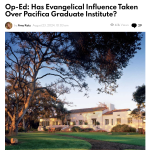
Daniel O. Snyder
When I first came to Pacifica in 1994, all of our classes were held on the Lambert Road campus. Some years later, long after graduation, when I returned for an alumni reunion, we met at the center on Ladera Lane. I learned that the property had been formerly owned by Jesuits, and sure enough I could discern the faint outlines of a large cross that had left its shadow on the far wall above the center platform. The cross had been removed, rightly so, given that Pacifica is not aligned with any specific religious tradition.
I was intrigued, however, by the fading image I saw on the wall. I came to Pacifica already established in a pastoral counseling practice, with two degrees from Christian seminaries, so perhaps the image caught my attention more than it might have for others. As I reflected on what I saw, I came to see the removal of the cross and the fading of its image as an act of liberation. Its service to the Jesuits now finished, the outward form could be dismantled, hopefully its materials recycled, and that which animated its imaginal life as a symbol of transformation could return to its native habitat in the soul where it could re-emerge in new symbolizations that could speak to the building’s new occupants.
Symbols of transformation are emergent. That is to say that they come alive in the midst of transformational processes in the psyche. For the Jesuits, steeped in Christian mysticism, the cross on the wall was surely iconic. That is, it would have served as a portal into the imaginal. In the absence of mystical perception, the outward form of the image can quickly shift from icon to idol. The icon is a window; the idol is opaque. The idol is the graven image, specifically prohibited in Exodus 20:4. It is unchanging, fixed, literal, ideological and idolatrous. The idol robs the icon of its function as a bridge to a living reality in the inner world. The Jesuits would have been watchful for any such spiritual bypass, knowing that when the image is concretized and objectified (from ob + jacere, meaning to throw something outward), it can be misused as an egoic defense against transformation.
Now, nearly 25 years since finishing at Pacifica, I hear that there is great controversy over allegations of an ideological “Christian” takeover of the school. It appears that the shadow of the cross has returned, but now in a more concretized form. Shadows, as we have all learned from our studies, tend to be rigid and inflexible. The shadow has returned as idol, more death than life, more imposition than invitation. Ideological Christianity is itself a graven image, chiseled into unchanging minds, and the objectified cross is its mascot. I can’t help but worry about the ghost of Constantine, claiming the cross as. a symbol of Empire, colonizing the imaginal, conscripting its rituals and symbols into rigid interpretive frames, domesticating Jesus, and co-opting the cross so that it can be sanitized and hung on a wall. Ideological Christianity, with all of its rigidities, is a plasticized version of Christianity’s true depths. The graven image, whether concretized in an object, or frozen into fixed ideas, is much like an inflated and defensive ego: it constellates an ever-growing shadow.
We are seeing this in the re-design of Pacifica’s logo. Now the cross is front and center and the serpent has been banished. Why fear the serpent that formerly graced Pacifica’s logo? Why remove an image of transformation and healing that has been life-giving for many Pacifica students, staff, and faculty? This cross, the idol, torn from its roots in the imaginal, is resistant to shedding its skin. Ideological Christianity takes the second creation myth in Genesis a little too literally and forces the serpent to carry its projections of evil. There is profound psychological wisdom in the Exodus prohibition against graven images, even against uttering the name of the Divine. Ideological Christianity is an inherent betrayal of the mythic and mystical depths of the tradition and its transformational possibilities.
Those of us who identify Christian must re-awaken to the imaginal origins of our tradition. Isn’t that what immersion in Soul does for all of us – help us fully to embrace the particularities of our unique lives while anchoring us in depths beyond mere beliefs, beyond rigid ideologies, even beyond words themselves? Not only does ideological Christianity cheapen our tradition and lead to cult-like thinking, it adds fuel to the fires of those on both the right and left who would cloak their polarizing political rhetoric in “Christian” robes. I have spent a lifetime resisting the ideological distortions of a tradition that I love, and as a pastoral psychotherapist I have worked with many clients who have been deeply wounded by them. I have also walked alongside many beautiful and creative souls whose language is very different than mine. It would be an unspeakable tragedy if Pacifica were to become entangled in and trapped by any ideology, Christian, “woke,” right, left, or for that matter any hardening of ideas into rigid forms.
A “crisis” is always an opportunity as well as a danger. Will Pacifica fall to the destructive energies of polarization, or can we be in service to Psyche and the already deeply polarized surrounding culture of our times by becoming a model of transformational shadow work?
Regardless of our political or religious affiliations, those of us who love Pacifica must safeguard its rare and precious commitment to Psyche’s many voices. Relationships across difference thrive best when we show up in the world more with presence than fixed beliefs. As my Quaker/Christian ancestors taught, your life will always speak louder than your words, and the living Spirit within you is infinitely creative in its religious imagination.
**********
1 PhD, Clinical Psychology, class of 2000. My book, Praying in the Dark: Spirituality, Nonviolence, and the Emerging World (Cascade, 2022) is an attempt to weave together the multiple strands of theology, depth psychology, and strategic nonviolence into an integrative vision of radical spirituality.



